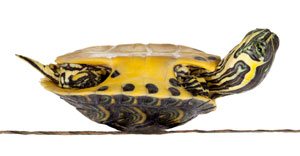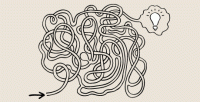Making Friends With Failure
No one likes failure, the F-word, no matter how you sugarcoat it. But failure is a part of life. Sometimes things don't work out. Sometimes you don't get what you want. Stuff happens. But if we recast these situations right, we learn to create a new normal, to persevere, to learn to be more flexible, or to redirect our energies.
Using the F-Word in School
There is a major disconnect between schools and the real world on the notion of failure. School teaches us there is only one answer for every problem. And if we don't get it, we are a failure. This dissuades students from trying -- they fear failure. We need to teach students how to make friends with failure.

Failure is hard for everyone, but interestingly, it's particularly hard for high-achieving students. They don’t know how to deal with this unfamiliar territory. It kills their spirit because their performance is so linked to their self-esteem. I've seen this firsthand as an Ivy-League professor, and it isn't pretty. Some high achievers don't deal with failure well. It can be so bad that some universities have decided to do something about it. In addition to the usual dorm counselors that can help students adjust to college life, Stanford University has created the Resilience Project, where prominent people, including former Supreme Court Justice Sandra Day O'Connor, tell their stories of failure. While there is limited access to this website, it shows how important the skill of embracing failure can be.
We need to give our children more opportunities to build a relationship with failure. In my estimation, science, technology, engineering and math (STEM) education is a key way to do it. In STEM, failure is a fact of life. Experiments don't work out, the data doesn't look right, or someone knocks over your experiment. There are plenty of places to learn persistence and resilience. We can also learn how failure is instructive to the design and innovation process. Science and innovation are based on trial-and-error (which is just a glorified way to say "fail a lot"). If children have to learn about failure, I would choose a setting where the stakes are not so high, and that would be with STEM.
One cure for the fear of failure is to rebrand it. As I say in my book Save Our Science, "Scientists fail all the time. We just brand it differently. We call it data." If you learned something from the experience, you did not fail. By rebranding failure to something as harmless as data, that failure loses its sting. Whatever you did was all part of a fact-finding mission!
Rebranding Failure
Schools have this failure-thing, the F-word, all wrong. They focus on getting the answer, but it is the questions and the mistakes that are actually more instructive. It's in these spaces where we learn. I often hear students preface their question with, "This might sound stupid, but . . . " Students fear sounding dumb -- they fear being viewed as a failure. Shouldn't it be OK to ask questions in a classroom?
We have to take the classroom back and make it a sacred space where asking questions is OK. And the instructor has to present vulnerability as well. If an instructor doesn't know the answer, he or she must be brave enough to say, "I don't know, but let's find out together." Education's focus on the right answer and the grades has made students afraid to ask questions. Deborah Stipek, Dean of Stanford's School of Education, writes in Science that schools incubate the fear of failure, which causes stress and anxiety to perform, which do not enhance learning.
This is ironic, since children are innately risk-takers. If there is a curb, they will try to balance on it. If there is a shiny object, they will reach out for it. This is how they discover the world. Failure and risk-taking are how they learn. However, that sense of discovery and wonder is squelched in the classroom. Testing removes our desire to take risks. We need to bring risk-taking back.
We need to teach children great stories of failure. Thomas Edison tried 10,000 different materials before he found the right one for the light bulb filament. Failure? No, that's data -- lots of it. Or as he put it, he learned 9,999 ways that it didn't work. To defuse the F-word, we should start Failure Clubs in our schools. At the meetings, students would report what they learned from taking a risk. We should award merit badges that would encourage children to take a risk, and we should ask them, "How did you fail? And what did you learn?"
To succeed, we must make friends with failure. Failure makes you a better, kinder, stronger and wiser human being.
Now, get out there and fail!
